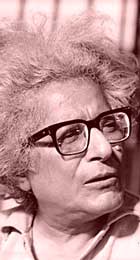 |
Subhas Mukhopadhyay, who died in Calcutta on Tuesday morning at the age of 84, had ushered in a new era of everyday idiom and revolutionary fervour in Bengali poetry with the publication in 1940 of Padatik, his book of poems. He rejected outright the highfalutin in favour of the rhythms and vocabulary of daily speech, and in both rhymes and blank verse experimented with metres and syllabic divisions.
Some of his best-known books of verse were Chirkoot, Agnikone, Jai Saite, Kaal Madhumash, Ektu Pa Chaliye Bhai and Chhele Gachhe Bane in reaction to the Naxalite movement. His “Phool phutuk na phutuk…” is one of the best known lines of modern verse.
His greatness lies in the fact that Mukhopadhyay evolved from time to time, says Joy Goswami. He never rested on his laurels where his language was concerned. Even in his last days when he had fallen ill, his sense of humour had not abandoned him. He would poke fun at the decrepit old man he had become.
In his last published poem, he was yet the radical of his Padatik days. Mukhopadhyay spoke of the need to act and bring about change instead of speaking about it.
Nirendranath Chakrabarty says Mukhopadhyay had opted for a very workaday way of life that was reflected in the language of both his prose and poetry. Mukhopadhyay never felt there was any need for a poetic diction. Like Wordsworth, he wrote in the “living language of men”.
Chakrabarty asserts that Mukhopadhyay may have been a Marxist to the last, but even those who were on the opposite ideological pole could not help liking him. He also had a keen sense of humour, which often informed his poetry. Very fond of fishing, he would go to the Hooghly often. Once he used a sweet as a bait. “Fish never get to eat dainty morsels. Perhaps, one will rise to the bait,” Mukhopadhyay had said.
In spite of his antecedents, he had won over the establishment and was awarded the Jnanpith in 1991.
Born in Krishnagore, Mukhopadhyay was deeply involved in Left politics from his student days. When he became a cult figure almost overnight, many of his poems could be interpreted as slogans of Marxist parties and were exploited as such.
Assessing Mukhopadhyay’s contribution to Bengali verse, Shankha Ghosh says he was a political person in the deepest and profoundest sense of the term. “His writing was deeply rooted in the human situation, the many obstacles one faces and tries to overcome.
Mukhopadhyay felt he could never write unless he could wander keeping his ears open to the speech patterns of ordinary people. No other poet wrote in a language so idiomatic.
Ghosh says Mukhopadhyay wrote about leading a simple and beautiful life and about the difficulties in doing so. His writings always reflected the political struggles of contemporary life. But when his fellow travellers themselves became rulers the struggle seemed to have become purposeless.
The Marxists who had once lauded him rejected him.











